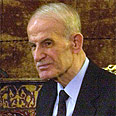
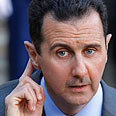
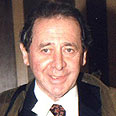
Hafez Assad's biographer: Syria won’t abandon Iran
In special interview, British journalist Patrick Seale tells Ynet Israel deluding itself if it believes Damascus will sever ties with Tehran. Peace between Jerusalem and Damascus possible only in framework of comprehensive deal that will include Palestinians, he says, adding that 'Netanyahu is doing the exact opposite of what is needed'
MALTA - He spent numerous hours with the Syrian leader who was closest to signing a peace agreement with Israel, and saw the hopes of Mideast peace fade before his eyes. Now, 10 years later, British journalist Patrick Seale warns of further deterioration: According to him, the Netanyahu government is not showing a desire to achieve peace and Turkish PM Erdogan is strengthening the Iran-Syria-Hezbollah axis.
Seale, who penned two books on Syria and its deceased leader Hafez Assad - The Struggle for Syria (1965) and Assad of Syria: The Struggle for the Middle East (1988) – spoke to Ynet in Malta during the Valdai Discussion Club conference.
Since the death of Assad the father, Seale has distanced himself from the regime in Damascus, but he still visits the country on occasion.
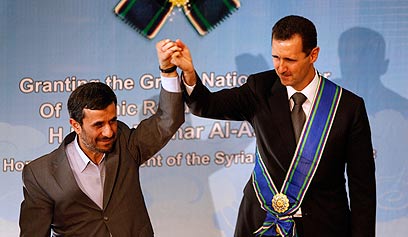
'Historic ties.' Iran's Ahmadinejad (L) and Bashar Assad (Photo: AP)
Seale does not see a concrete threat of a war between Israel and Syria, despite current Syrian President Bashar Assad's belligerent rhetoric, but he does not rule it out either. He says the Israeli government is a cause for concern not only in the Middle East, but in the West as well. According to Seale, the settlement enterprise poses a grave threat to western interests. He claims a resolution to the Israel-Syria conflict is possible only if it coincides with a peace agreement between Israel and the Palestinians.
"Assad wants peace; he has said this a thousand times," Seale says. "Full normalization (of Israel-Syria relations) can only transpire in the framework of a comprehensive agreement that will include the Palestinians. Don't expect him (Assad) to abandon the Palestinians, or Iran for that matter."
According to the British journalist, it does not appear as though the Syrians or Netanyahu believe a peace agreement is possible.
"You saw Netanyahu planting a tree in the Golan Heights. Unfortunately, Israel has adopted its old security doctrine. I recommend that Israel realize the urgent need for the establishment of a Palestinian state, which will be the key to its integration into the region and the normalization of its relations with the Arab and Muslim world," Seale says.
"The solution is so clear, but they are doing the exact opposite."
Terror, he says, has become a global threat on the West, and the only way to defeat it is by solving the Mideast conflict, "but he (Netanyahu) doesn’t want to."
"The current Israeli government does not want an agreement. It wants 'greater Israel'," he says, referring to the ongoing construction in the West Bank's Jewish settlements.
Seale rejects the notion that Hafez Assad would not have approved of the strengthened ties between Damascus and Tehran, saying "for Syria, the relations with Iran are historic. They go back 30 years, and they are very tight."
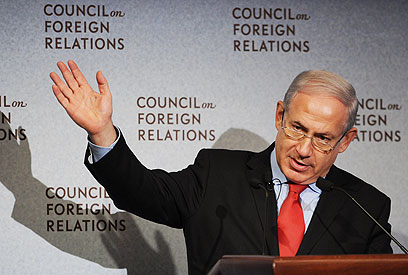
'Wants greater Israel.' Netanyahu (Photo: AFP)
The journalist says Syria feels even stronger now that it has Turkey on its side. "This is very dangerous for Israel. I think there is a regional atmosphere of deterioration," he says.
Seale notes that Hafez Assad was the "architect" of Syria's relations with the Islamic Republic.
"Even prior to the revolution in Iran, the Persian Shah's enemies were based in Damascus," he says. "Syria and Iran need each other. They don't agree on everything, this is clear. Israel and the United States don’t agree on everything either."
Seale mentions that during his recent visit to Lebanon, Turkish Prime Minister Recep Tayyip Erdogan said he would not sit still if Israel were to attack Lebanon. "Therefore, Israel must reexamine its security doctrine, according to which 'we must be stronger than any regional (group of countries).' This only increases the hostility," he claims.
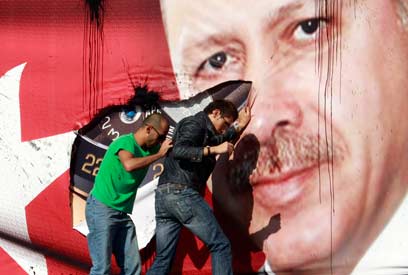
'Syria feels stronger.' Erdogan poster in Lebanon (Photo: Reuters)
"I believe that if Israel attacks Lebanon or Iran, other countries may be dragged (into the conflict)," Seale says. When asked about the Scud missiles Syria has reportedly transferred to Lebanon, the journalist says, "Where are they – the Scud missiles? There is no proof of this. But if Israel attacks Lebanon there is a chance Syria will be dragged in. There is an alliance between Iran, Syria and south Lebanon, and you cannot ask Syria to abandon this alliance."
Ahead of the publication of the findings of a UN investigation into the assassination of former Lebanese Prime Minister Rafik Hariri, western and Mideast countries, particularly Israel, fear that a civil war may break out.
The UN tribunal is expected to indict high-ranking Hezbollah operatives in the 2005 Beirut bombing that killed Hariri and 22 others. The Shiite group said such a development would cause tensions to boil over.
"Everyone wants to avoid steps that may destabilize Lebanon, which has suffered enough," Seal says. "Lebanon and Syria have mutual interests. This must be respected. I think we'll see a sort of compromise, but it's hard to predict."
Seale does not believe Hezbollah will resort to violence following the publication of the investigation's findings. "Hezbollah has a smart leadership which does not want to rule Lebanon; it wants to control Lebanon's Shiites, who make up some 35-40% of the population," he claims.
According to the journalist, Syrian President Bashar Assad "wants to create a modernized country; develop it economically, educationally and scientifically.
"(Assad) wants to open up to the West; this is why he recently visited Paris. He has a lot more work to do in the fields of civil rights and freedom of expression, but he's moving in the right direction in such a hostile region," Seale says.
- Follow Ynetnews on Facebook















